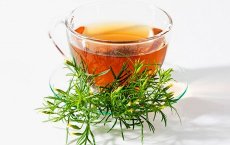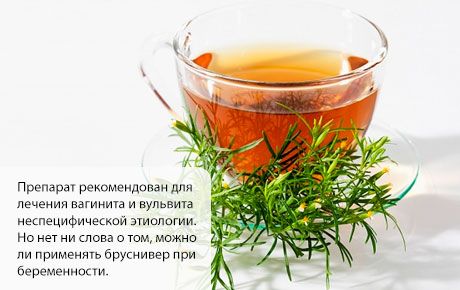Medical expert of the article
New publications
Preparations
Brusniver in pregnancy: for or against?
Last reviewed: 04.07.2025

All iLive content is medically reviewed or fact checked to ensure as much factual accuracy as possible.
We have strict sourcing guidelines and only link to reputable media sites, academic research institutions and, whenever possible, medically peer reviewed studies. Note that the numbers in parentheses ([1], [2], etc.) are clickable links to these studies.
If you feel that any of our content is inaccurate, out-of-date, or otherwise questionable, please select it and press Ctrl + Enter.

The official instructions for lingonberry during pregnancy state that it is a “herbal preparation with diuretic, antimicrobial and anti-inflammatory action.”
Brusniver is a drug sold without a prescription and used in urology, gynecology and proctology. Regarding its use in gynecology, it is noted that this drug is recommended for the treatment of vaginitis and vulvitis of non-specific etiology. But there is no word on whether Brusniver can be used during pregnancy.
Is it possible to eat lingonberry during pregnancy?
Contraindications to the use of the drug Brusniver include hypersensitivity to its components, and side effects may manifest themselves in the form of allergic reactions.

However, many information sources report that (we quote) "the use of this product is permitted in all trimesters of pregnancy... Brusniver during pregnancy (in the third trimester) can be prescribed for the purpose of preventing edema." But nothing of the sort is written in the official instructions!
Brusniver for edema during pregnancy contains the following: lingonberry leaves (50%), St. John's wort (20%), three-part succession herb (10%) and rose hips (20%).
Brusniver tea during pregnancy - two-gram filter bags that need to be brewed like regular tea, infused and drunk a quarter of a glass 3-4 times a day. The effect is anti-inflammatory and diuretic, that is, diuretic.
As stated in the instructions, the anti-inflammatory and diuretic effect of the herbal preparation is due to the beneficial substances of the medicinal plants included in its composition: tannins and polysaccharides of the succession; vitamins, sugars and organic compounds of rose hips; flavonoids, anthraquinones and essential oils of St. John's wort. As well as glycosides (arbutin), tannins, flavonoids and organic acids, which contain lingonberry leaves.
How to take Brusniver during pregnancy?
Rose hips and lingonberry leaves, which have a diuretic effect, have no contraindications during pregnancy, but, as herbalists claim, they should not be mixed with herbs, since many medicinal plants cannot be used during pregnancy. In addition, rose hip infusion - despite all its unconditional benefits - is not recommended for gastritis, a tendency to form blood clots (due to vitamin K), problems with blood pressure (hyper- and hypotension), and constipation.
An infusion of lingonberry leaves (without adding any other herbs, as in brusniver) has long been used as a proven and safe diuretic for pregnant women: a teaspoon of crushed leaves is poured with 200 ml of boiling water, infused for 30-40 minutes and taken before meals, a tablespoon - three times a day.
Three-part Bidens has diuretic and diaphoretic properties, normalizes digestion and metabolism. All this is the effect of the essential oils, flavonoids, bitters and organic acids it contains. The presence of manganese in this plant determines its effect on the processes of hematopoiesis and blood clotting, and tannins provide bactericidal properties of Bidens. Bidens infusion is drunk to reduce blood pressure, increase appetite, with neuroses, neurasthenia, convulsions, headaches and insomnia. But prolonged use of this plant can cause increased nervous excitability and stool disorders.
Is it possible to eat lingonberry during pregnancy if it contains St. John's wort, and in the same quantity as rose hips... In its chemical composition, St. John's wort contains tannins, isovaleric acid esters, quercitrin, phytosterol β-sitosterol, flavonoids (hyperoside, hyperin and rutin), saponins, etc. A decoction and infusion of this plant are widely used in folk medicine as an astringent for diseases of the stomach, intestines, liver and gall bladder. And novoimanin (a preparation based on St. John's wort) is used to treat abscesses, phlegmon, infected wounds and burns.
But before drinking lingonberry during pregnancy, it should be borne in mind that the β-sitosterol present in St. John's wort reduces the cholesterol content in the blood plasma due to its increased excretion, and the liver tries to compensate for the loss of cholesterol and begins to produce it more actively. In addition, β-sitosterol is involved in reducing the level of tocopherol (vitamin E) and provitamins of vitamin A (α-carotene and β-carotene) in human blood.
And that's not all. The substances contained in St. John's wort accelerate the body's production of CYP enzymes (cytochrome P450), which participate not only in the biosynthesis of bile acids and cholesterol, but also in the metabolism of the female sex hormone estrogen. And the flavonoid hyperin has a sedative effect on the human nervous system and is used as an antidepressant, eliminating the feeling of fear and anxiety. But at the same time, hyperin increases blood pressure and... contributes to the appearance of edema. Therefore, taking drugs containing St. John's wort during pregnancy is strictly contraindicated.
Reviews of Brusniver during pregnancy
According to reviews of lingonberry during pregnancy, which can also be easily found on the Internet, "this mixture has a weak effect on the body and does not harm the child in any way. All the herbs included in lingonberry are not only safe, but also extremely useful for the expectant mother"...
Some people claim that they drink lingonberry tea during pregnancy "simply as a vitamin tea, especially during periods of vitamin deficiency or flu epidemics, as well as during periods of increased physical and mental stress, since lingonberry leaves and rose hips are very rich in vitamins." Then, as a rule, it is said that the drug can be bought at a pharmacy and the price of lingonberry during pregnancy is indicated - for 20 filter bags...
Now let's get back to the title of this publication - lingonberry during pregnancy: for or against? We hope that you will find the right answer to this question. And you will solve the problems that most pregnant women face in the safest way possible.
Attention!
To simplify the perception of information, this instruction for use of the drug "Brusniver in pregnancy: for or against?" translated and presented in a special form on the basis of the official instructions for medical use of the drug. Before use read the annotation that came directly to medicines.
Description provided for informational purposes and is not a guide to self-healing. The need for this drug, the purpose of the treatment regimen, methods and dose of the drug is determined solely by the attending physician. Self-medication is dangerous for your health.


 [
[